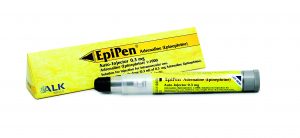 The EpiPen scandal, another problem when capitalism meets healthcare and a monopoly exists.
The EpiPen scandal, another problem when capitalism meets healthcare and a monopoly exists.
By now, you are probably more than familiar with the EpiPen, a device owned and distributed by Mylan, who has continually raised the price of this lifesaving device repeatedly since 2007. Before, this, we heard about another drug company buying a brand and then jacking up the price to ridiculous levels.
As a consumer, we are appalled, but without any true competition, and without any sort of price controls, other than the social media, and its ability to embarrass a CEO who themselves have raised their pay as they increased their profits, the prices continue to rise.
The evidence continues to build on why we need single payer government run healthcare, but the model that we are likely to adopt (Medicare for all) has a horrible drug component that does not allow us to engage with a drug manufacturer in any meaningful way to negotiate the prices. They always throw out the R and D talking point, but some drug companies spend more on wining and dining your doctor and television ads than they will do with actual research.
While some products may prop up the profitability of others in a drug company, the fact that there is little competition for non generic drugs due to patents, is part of why the prices are higher here than anywhere else, and without knowing truly what it costs to make, produce and distribute, and what is a reasonable profit margin overall for all your products, how can you effectively negotiate?
The EpiPen can be a lifesaver if you are allergic to bee stings, where the shot will reverse the effects of an allergic reaction to the sting that can essentially kill you. The real concern is, how much should it cost?
True, the device is patented. Also true, is they just released a lower priced generic version. More true is that the medication inside it will expire and need to be replaced and cared for within certain temperature limits.
My question is, since the medication (Epinephrine) expires, and not the pen which is designed for a single use, why don’t they redesign it to accommodate a cartridge than can be replaced if it expires and since the active ingredient is inexpensive ($10 for a syringe and the Epinephrine), how did we get to a price of $600 for two of them?
Something is really wrong when it is OK for a drug company to hold our health hostage.
Check out this NY Times article on the EpiPen.
The EpiPen, a Case Study in Health System Dysfunction
Aaron E. Carroll
Three times in the last two weeks, people “” a patient, a colleague and my wife “” told me stories about how out of control the price of EpiPens were. Monday, my New York Times colleagues recounted in detail how expensive the devices have become in recent years. All tell the tale of how much even basic health care can cost in the United States.
But by digging a bit further, the story of EpiPens can also explain so much of what”™s wrong with our health care system.
When people think of allergies to drugs, food or a bee sting, they often think of a rash. And in fact that”™s how many allergic reactions develop and proceed. Most can be treated with diphenhydramine (Benadryl) and careful observation. But some are more serious. Between 1 and 2 percent of people can develop what”™s known as anaphylaxis, when the airways you need to breathe swell and close.
Luckily, there”™s a simple treatment for such reactions. Epinephrine “” or adrenaline “” is a hormone naturally produced by the adrenal glands. It”™s part of your “œfight or flight” response, and it causes your heart to beat faster, your blood vessels to constrict, your pupils to dilate and “” most important here “” your airways to open.